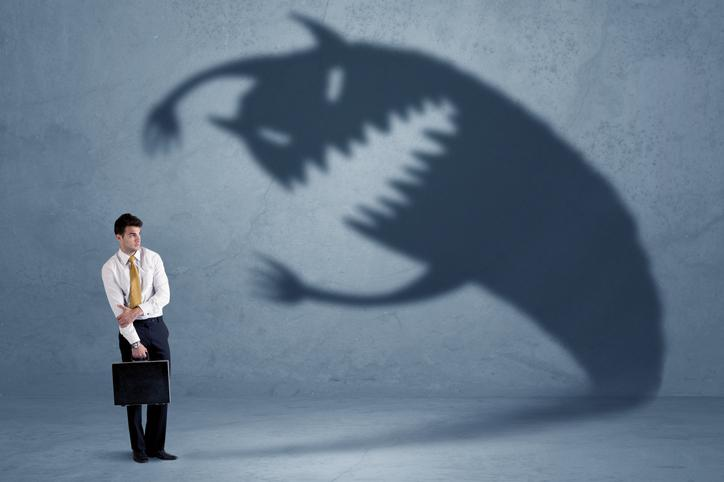Let's talk about: Fear of failure💙 [ESP/ING]
¡Hola, linda comunidad de Hive!💙| Hello, beautiful Hive community!💙

Talking about things that can be useful for you in the psychological field is something that I like very much and well, I will tell you about a reality that I have lived in recent days in my student environment, I am in the last weeks of the semester and there is a specific subject in which I am doing very badly, I have felt very bad about it and although it is my fault, it has caused me the so feared: fear of failure.

El miedo al fracaso esta definido como “miedo irracional y muy intenso a fracasar o a cometer errores”, aunque en lo personal creo que se trata de una manera de presentarse la ansiedad ya que suele aparecer siempre que en nuestra vida se aproxima un reto o una prueba importante que podría modificar nuestro futuro a corto, mediano o largo plazo. Muchas veces esto se produce por un mal concepto de fracaso y es que al sentir la presión del momento sentimos que al fracasar causaremos un daño irreversible y hay 2 maneras de actuar frente a esto:
The fear of failure is defined as "irrational and very intense fear of failing or making mistakes", although personally I think it is a way of presenting anxiety as it usually appears whenever in our life a challenge or an important test that could change our future in the short, medium or long term is approaching. Many times this is produced by a bad concept of failure and when we feel the pressure of the moment we feel that by failing we will cause irreversible damage and there are 2 ways to act in front of this:

🔹Evitación o Sobrecompensación.🔹
Avoidance or Overcompensation.
Evitación: Con esta respuesta la persona tiende a huir o evitar las situaciones en donde se pueda producir un fracaso y aquí es donde entra en juego algo que hacemos todos de manera inconsciente, la procastinación y comenzamos a dejar las tareas importantes “para después” y terminamos haciendo todo a ultima hora o… no haciéndolo.
Avoidance: With this response the person tends to flee or avoid situations where failure may occur and this is where something we all do unconsciously comes into play, procastination, and we begin to leave important tasks "for later" and end up doing everything at the last minute or... not doing it at all.

Sobrecompensacion:
Este punto suele parecernos lo mas “sano” pero tampoco lo es, porque aquí solemos hacer un sobreesfuerzo para que no haya “espacio para el fracaso” pero entonces dejamos de hacer cosas que son importantes en otros ámbitos de nuestra vida, descuidando incluso nuestra salud. Son personas con autoexigencias súper elevadas que sobrepasan los limites entre “aplicado” y “obsesionado”, y como dije antes ponen en riesgo otros ámbitos de su vida como la salud u otras necesidades.
Overcompensation: This point usually seems to us the most "healthy" but it is not either, because here we tend to make an overexertion so that there is no "room for failure" but then we stop doing things that are important in other areas of our life, neglecting even our health. They are people with super high self-demands that exceed the limits between "applied" and "obsessed", and as I said before they put at risk other areas of their life such as health or other needs.


🔹Consecuencias🔹
Consequences
Como todos los malos hábitos, el miedo al fracaso no se queda atrás y aunque puede ser diferente en cada quien, las consecuencias que tienden a ser más generales son:
Like all bad habits, fear of failure is not far behind and although it may be different for everyone, the consequences tend to be more general:
- Malestar con uno mismo y baja autoestima porque creeremos que somos menos capaces y que quizá ese no sea el camino adecuado para nosotros
- Quedarse en blanco, este punto me parece el mas común de todos! Es como un bloqueo cognitivo que no te deja pensar con claridad que hacer para que no afecte por completo nuestra vida, incluso la misma presión que ejercemos en nosotros mismos puede producir este bloqueo ANTES de obtener una respuesta a nuestro esfuerzo. (Bloqueos en plena presentación, en pleno examen o así lo que puede evitar por completo que el resultado sea positivo)
- Ansiedad y ataques de pánico: Hablar de ansiedad es un tema bastante delicado y extenso porque hay gran cantidad de síntomas que pueden afectarnos y es que cuando llega un punto de estrés máximo en nosotros pueden producirse pensamientos de que va a ocurrir algo malo, aumento del pulso cardíaco, sudores, temblores, hormigueos en las extremidades, dolor de cabeza, pinchazos en el pecho, sensación de mareo y/o sensación de que falta el aire y cuando la ansiedad llega a su punto máximo se pueden producir ataques de pánico.
- No lograr nuestras metas propuestas. Debido a todas las consecuencias negativas que acarrea el miedo al fracaso, si no sabemos manejarlo para enfocarnos realmente no alcanzáremos los objetivos que tenemos propuestos. Aunque esta más que claro que si constantemente no afrontamos las situaciones que se presentan no vamos a poder llegar a cumplir nuestros objetivos porque nunca daremos base a que se cumplan. Por otro lado, la alta autoexigencia tampoco es la mejor opción para lograrlos porque la ansiedad por ser perfectos o por hacer todo como planemos puede ser un arma de doble filo que nos hará fracasar.
- Discomfort with oneself and low self-esteem because we will believe that we are less capable and that this may not be the right path for us.
- Going blank, this point seems to me the most common of all! It is like a cognitive block that does not let you think clearly what to do so that it does not completely affect our life, even the same pressure that we exert on ourselves can produce this blockage BEFORE getting an answer to our effort (blockages in full presentation, in full exam or so what can completely prevent the result to be positive).
- Anxiety and panic attacks: Talking about anxiety is a rather delicate and extensive subject because there are a great number of symptoms that can affect us and when we reach a point of maximum stress we may have thoughts that something bad is going to happen, increased heart rate, sweating, trembling, tingling in the extremities, headache, chest pain, dizziness and/or shortness of breath and when anxiety reaches its peak, panic attacks may occur.
- Not achieving our proposed goals. Due to all the negative consequences of the fear of failure, if we do not know how to handle it to really focus we will not achieve the objectives we have proposed. Although it is more than clear that if we constantly do not face the situations that arise we will not be able to achieve our goals because we will never give basis for them to be fulfilled. On the other hand, the high self-demand is not the best option to achieve them because the anxiety to be perfect or to do everything as we plan can be a double-edged sword that will make us fail.


🔹¿Qué podemos hacer?🔹
What can we do?
- Observa tu dialogo interno, evita decirte “no puedo”.
- Ponte metas más realistas.
- Toma una visión mas objetiva del fracaso, fracasar una vez no significa fracasar toda la vida.
- Toma en cuenta que es imposible evitar el fracaso, no subestimes tu capacidad para enfrentar los problemas.
- Pide ayuda si la necesitas.
- Observe your internal dialogue, avoid telling yourself "I can't".
- Set more realistic goals.
- Take a more objective view of failure, failure once does not mean failure all your life.
- Keep in mind that it is impossible to avoid failure, do not underestimate your ability to face problems.
- Ask for help if you need it.


Failure although it sounds ugly to say it is part of the cycle of progress, at least once we will fail in a situation and from there we will learn to be more patient, constant and understand what things work for us and what things don't! Failure does not mean that things will never be as we expect, as long as this does not become a habit, it will only be part of the learning process.
Espero que les haya gustado mi post!💙
I hope you liked my post!💙

0
0
0.000
0 comments